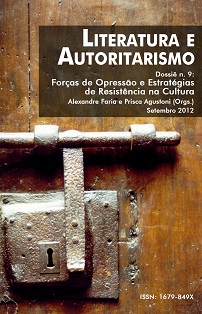Literature and politics: way of life or way-of-life?
DOI:
https://doi.org/10.5902/1679849X75378Keywords:
Il Politecnico, Elio Vittorini, Political literature, Literary politicsAbstract
Literature as a battle of ideas, initiation, evocation and modulation of shadows, unpublished languages are issues that permeate the intellectual production and performance of Elio Vittorini. The close relationships between art, thought and politics mark the development of the magazine Il Politecnico, headed by writer, launched in the immediate postwar period. The essay intends to discuss the tensions in those relationships from some fragments of the magazine.
Downloads
References
AGAMBEN, Giorgio. A comunidade que vem. Tradução António Guerreiro. Lisboa: Editorial Presença, 1993.
AGAMBEN, Giorgio. “Arte, Inoperatividade e Política”. In: GUERREIRO, Antonio. Críticas do contemporâneo. Fundação Serralves, 2007.
FORTINI, Franco. “Chiusura di una polemica - Cultura come scelta necessária”. In: FORTI, Marco; PAUTASSO, Sergio. Il Politecnico – antologia critica. Milão: Lerici Editori, 1960.
FORTI, Marco; PAUTASSO, Sergio. Il Politecnico – antologia critica. Milão: Lerici Editori, 1960.
VERBARO, Caterina; LUTI, Giorgio. Dal Neorealismo alla Neoavanguardia. Il dibattito letterario in Italia negli anni della modernizzazione (1945-1969). Firenze: Casa Editrici Le Lettere, 1995.
VITTORINI, Elio. Gli anni Del “Politecnico” - Lettere 1945-1951. Organizado por Carlo Minoia. Turim: Einaudi, 1977.
VITTORINI, Elio. Cultura e Libertà – saggi, note, lettere da “Il Politecnico e altre lettere. Organização de Rafaele Crovi. Turim: Nino Aragno, 2001, pp. 19-20.
Downloads
Published
How to Cite
Issue
Section
License
DECLARAÇÃO DE ORIGINALIDADE E EXCLUSIVIDADE E CESSÃO DE DIREITOS AUTORAIS
Declaro que o presente artigo é original e não foi submetido à publicação em qualquer outro periódico nacional ou internacional, quer seja em parte ou na íntegra. Declaro, ainda, que após publicado pela Literatura e Autoritarismo, ele jamais será submetido a outro periódico. Também tenho ciência que a submissão dos originais à Literatura e Autoritarismo implica transferência dos direitos autorais da publicação digital. A não observância desse compromisso submeterá o infrator a sanções e penas previstas na Lei de Proteção de Direitos Autorais (nº 9610, de 19/02/98).






